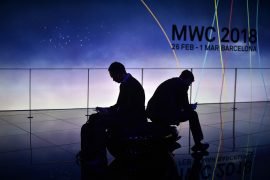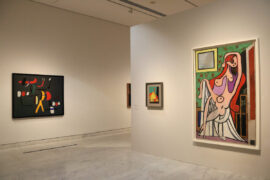In hospitals, besides managing health, they manage life and death...

The successful Mobile World Congress held recently in Barcelona has...

Experiencing a match day in the Wanda Metropolitano Stadium allows...

The direct relationship between intelligence and success applies to any...

Pregnancy immerses the expectant woman in a sea of joys...

The two artists embrace each other in a joint exhibition...

Since the Walkman we have walked from one place to...

Jane Goodall travels the world 300 days a year asking...

Who is primarily responsible for the so-called "greenhouse effect"? What...

Three Catalan restaurants – El Celler de Can Roca (2),...

Música clásica sobre la arena de la playa en dos...

The first session of the cycle on the regatta organized...

The hospital's managing director, Manel del Castillo, and the pharmaceutical...

Generalitat y Ayuntamiento impulsarán dos equipamientos de 'Casa de les...

Leticia Beleta, director of Alexion Pharmaceuticals in Spain and Portugal,...

We all have a friend who never leaves the Gràcia...

Barcelona director opts for Best International Film with 'La sociedad...

The hotel and industrial sectors softened the market's decline last...

The technology company, with a workforce of 35 employees and...

“The women of yesteryear were strong and had to fight...
[dropcap letter=”I”]
n Edward Albee’s play Who’s Afraid of Virginia Woolf?, one of its main characters, Honey, admits to having peeled the label off a bottle of brandy, to which George replies that we all peel labels, sweetie, and when you get through the skin, all three layers, through the muscle, slosh aside the organs, and get down to the bone, you haven’t got all the way, yet. There is something inside the bone, the marrow, and that’s what you gotta get at. Peeling labels and getting down to the bone in literature is no less than the vital and cruel practice of one of the most mysterious of them all, Michiko Kakutani. Distinguished critic of The New York Times since 1983, the source of reference for news from the United States, Ms Kakutani is a ferocious iconoclast and the most powerful guardian of American literary culture. However, little do we know about her, even less than about J. D. Salinger.
A favourable review in The New York Times can turn the book into a bestseller, a favourable one could send it to oblivion. “You need no less than three exalted review to make up for the damage”, said Norman Mailer in an enraged letter to the New York Times’ director. “She is a one-woman kamikaze”, and went on to say “she’s a threefer: Asiatic, feminist and, what’s the third? Well. Let’s just call her a twofer”. Kakutani described one of his books as “silly, self-important and at times inadvertently comical book”. David Foster Wallace admitted to having locked himself in his bedroom and cried for two days after having read one favourable-yet-bitter-in-parts review by Ms Kakutani on his first novel, The Broom of the System.
What do we know about her? According to official records, she was born in 1955, the only child of a Japan-born Yale mathematician. She received her B.A. in English Literature from Yale University in 1976. She initially worked as a reporter for The Washington Post, and then in 1979 joined The New York Times and appointed as its chief book critic. In 1998 she received the Pulitzer Prize for Criticism. The reviews selected for the prize included one review to Mason & Dixon’s Thomas Pynchon that concludes that it is —“as moving as it is cerebral, as poignant as it is daring”—, Don DeLillo’s Underworld, described as a “breathtaking masterpiece”, a solid News of a Kidnapping by García Márquez whose narrative possesses —“all the drama and emotional resonance of Garcia Marquez’s most powerful fiction”—, just as he ferociously censored Hapworth 16, 1924 by J. D. Salinger, described as “a sour, implausible and, sad to say, completely charmless story”, or John Updike’s Towards the End of Time. She wonders: “How could this novelist write such a perfunctory book?”. And, the inevitable slap to her bête noire, Gospel According to the Son by Norman Mailer: “Mailer’s Jesus sounds an awful lot like a guest on Oprah”.
The only rumour about her love life is a relationship with Woody Allen. She interviewed him for The Paris Review in a long dinner at Élaine’s Restaurant, known for its star customer. Some of her most memorable quotes are, “shy on acquaintance, he once expressed an intense desire to return to the womb, “anybody’s”, or “What I really like to do best is whatever I’m not doing at the moment”. Ms Kakutani also talks about outstanding books, top interest biographies and political volumes that are hot in the media and require a firm hand: Bush, Obama, the Pope. Her reviews are never ambiguous, they are witty, incisive and clinically precise. Her expertise allow her to contextualize a work within the author’s creative career, and she is relentless in doing so, as she had also been there. Her analyses define her taste, everyone must know what Michi thinks. She zeroes in on everything without being noticed. She is temperamental, a mystery, almost a diva. She is the Oracle in Matrix, as untouchable as Eliot Ness, she has been likened to Keyser Söze.
Only two friends to her fold, a Times’ rat pack of sorts: the feared political commentator Maureen Dowd, who received a Pulitzer in 1992, whose opera prima was Are men necessary?: “If there is something that men fear —Dowd wrote— is a woman who uses her critical skills”. Rumour has it that Ms Kakutani called her, immediately after being awarded her Pulitzer to express her regret to the fact that she would no longer be able to have an appointment with anybody. The third Witches of Eastwick —John Updike’s eponymic novel became kakutanied as a “nonsensical entanglement”— is the all-powerful former tv critic Alessandra Stanley, who is currently covering the press of the filthy rich from the US, effectively one per cent of one per cent.
“Her criticism to my books is both stupid and frivolous”, replied Susan Sontag when Ms Kakutani panned her essay Against Interpretation. She described Jonathan Franzen’s biography, Cold Zone, as a “hateful portrait of a teenage idiot”, to which he described her as “the stupidiest person in New York”. Martin Amis’s Yellow Dog “bears as much resemblance to Mr. Amis’s best fiction as a bad karaoke singer does to Frank Sinatra, as a kitchen magnet of Munch’s Scream does to the real painting”. Imagine what a breakfast time Amis had that morning. Nicholson Baker compared her reviews to a kidney extraction without anaesthesia.
Now picture this: Ms Kakutani smiling and replying like Martha in Who’s Afraid of Virginia Woolf?: “Oh, I like your anger. I think this is what I like mostly about you. Your anger”. Everything flows together to create the mystery of one of the most unknown woman of US literature, all-powerful and really really funny. In fact, in an attempt to have fun, she has come to the point of writing reviews mimicking the voices of Holly Golithly, Holden Caulfield, Austin Powers or even Brian Griffin, the dog in the tv series Family Guy. What’s her secret? The freedom of writing what she thinks, thanks to the relentless support from her bosses. Rushdie referred to her as “a weird woman who seems to feel the need to alternately praise and spank”, on reading that she considered that Enchantress of Florence “lacked magic”. And here we have Ms Kakutani, replying as Martha would: “I am not a monster. I am not”. Smile.
Margaret Atwood may have hit the nail on the head, despite her novel Oryx and Crake was described as a “lame piece of sci-fi humbug”. Michiko Kakutani is a necessary evil. “She praises you one minute and the next she tears you apart to save you from self-indulgence”. A free critic carries out a hygienic task. Writers can rest assured that there is always someone who waits for the best from them. Always. Virginia Woolf encourages in her essay How Should One Read a Book? to think about how our criteria and judgements create the atmosphere that writers breathe when they work. Are they not criminals, books that have wasted our time and sympathy; are they not the most insidious enemies of society, corrupters, defilers, the writers of false books, faked books, books that fill the air with decay and disease? Let us then be severe with our judgements; let us compare each book with the greatest of its kind.”.
[dropcap letter=”I”]
n Edward Albee’s play Who’s Afraid of Virginia Woolf?, one of its main characters, Honey, admits to having peeled the label off a bottle of brandy, to which George replies that we all peel labels, sweetie, and when you get through the skin, all three layers, through the muscle, slosh aside the organs, and get down to the bone, you haven’t got all the way, yet. There is something inside the bone, the marrow, and that’s what you gotta get at. Peeling labels and getting down to the bone in literature is no less than the vital and cruel practice of one of the most mysterious of them all, Michiko Kakutani. Distinguished critic of The New York Times since 1983, the source of reference for news from the United States, Ms Kakutani is a ferocious iconoclast and the most powerful guardian of American literary culture. However, little do we know about her, even less than about J. D. Salinger.
A favourable review in The New York Times can turn the book into a bestseller, a favourable one could send it to oblivion. “You need no less than three exalted review to make up for the damage”, said Norman Mailer in an enraged letter to the New York Times’ director. “She is a one-woman kamikaze”, and went on to say “she’s a threefer: Asiatic, feminist and, what’s the third? Well. Let’s just call her a twofer”. Kakutani described one of his books as “silly, self-important and at times inadvertently comical book”. David Foster Wallace admitted to having locked himself in his bedroom and cried for two days after having read one favourable-yet-bitter-in-parts review by Ms Kakutani on his first novel, The Broom of the System.
What do we know about her? According to official records, she was born in 1955, the only child of a Japan-born Yale mathematician. She received her B.A. in English Literature from Yale University in 1976. She initially worked as a reporter for The Washington Post, and then in 1979 joined The New York Times and appointed as its chief book critic. In 1998 she received the Pulitzer Prize for Criticism. The reviews selected for the prize included one review to Mason & Dixon’s Thomas Pynchon that concludes that it is —“as moving as it is cerebral, as poignant as it is daring”—, Don DeLillo’s Underworld, described as a “breathtaking masterpiece”, a solid News of a Kidnapping by García Márquez whose narrative possesses —“all the drama and emotional resonance of Garcia Marquez’s most powerful fiction”—, just as he ferociously censored Hapworth 16, 1924 by J. D. Salinger, described as “a sour, implausible and, sad to say, completely charmless story”, or John Updike’s Towards the End of Time. She wonders: “How could this novelist write such a perfunctory book?”. And, the inevitable slap to her bête noire, Gospel According to the Son by Norman Mailer: “Mailer’s Jesus sounds an awful lot like a guest on Oprah”.
The only rumour about her love life is a relationship with Woody Allen. She interviewed him for The Paris Review in a long dinner at Élaine’s Restaurant, known for its star customer. Some of her most memorable quotes are, “shy on acquaintance, he once expressed an intense desire to return to the womb, “anybody’s”, or “What I really like to do best is whatever I’m not doing at the moment”. Ms Kakutani also talks about outstanding books, top interest biographies and political volumes that are hot in the media and require a firm hand: Bush, Obama, the Pope. Her reviews are never ambiguous, they are witty, incisive and clinically precise. Her expertise allow her to contextualize a work within the author’s creative career, and she is relentless in doing so, as she had also been there. Her analyses define her taste, everyone must know what Michi thinks. She zeroes in on everything without being noticed. She is temperamental, a mystery, almost a diva. She is the Oracle in Matrix, as untouchable as Eliot Ness, she has been likened to Keyser Söze.
Only two friends to her fold, a Times’ rat pack of sorts: the feared political commentator Maureen Dowd, who received a Pulitzer in 1992, whose opera prima was Are men necessary?: “If there is something that men fear —Dowd wrote— is a woman who uses her critical skills”. Rumour has it that Ms Kakutani called her, immediately after being awarded her Pulitzer to express her regret to the fact that she would no longer be able to have an appointment with anybody. The third Witches of Eastwick —John Updike’s eponymic novel became kakutanied as a “nonsensical entanglement”— is the all-powerful former tv critic Alessandra Stanley, who is currently covering the press of the filthy rich from the US, effectively one per cent of one per cent.
“Her criticism to my books is both stupid and frivolous”, replied Susan Sontag when Ms Kakutani panned her essay Against Interpretation. She described Jonathan Franzen’s biography, Cold Zone, as a “hateful portrait of a teenage idiot”, to which he described her as “the stupidiest person in New York”. Martin Amis’s Yellow Dog “bears as much resemblance to Mr. Amis’s best fiction as a bad karaoke singer does to Frank Sinatra, as a kitchen magnet of Munch’s Scream does to the real painting”. Imagine what a breakfast time Amis had that morning. Nicholson Baker compared her reviews to a kidney extraction without anaesthesia.
Now picture this: Ms Kakutani smiling and replying like Martha in Who’s Afraid of Virginia Woolf?: “Oh, I like your anger. I think this is what I like mostly about you. Your anger”. Everything flows together to create the mystery of one of the most unknown woman of US literature, all-powerful and really really funny. In fact, in an attempt to have fun, she has come to the point of writing reviews mimicking the voices of Holly Golithly, Holden Caulfield, Austin Powers or even Brian Griffin, the dog in the tv series Family Guy. What’s her secret? The freedom of writing what she thinks, thanks to the relentless support from her bosses. Rushdie referred to her as “a weird woman who seems to feel the need to alternately praise and spank”, on reading that she considered that Enchantress of Florence “lacked magic”. And here we have Ms Kakutani, replying as Martha would: “I am not a monster. I am not”. Smile.
Margaret Atwood may have hit the nail on the head, despite her novel Oryx and Crake was described as a “lame piece of sci-fi humbug”. Michiko Kakutani is a necessary evil. “She praises you one minute and the next she tears you apart to save you from self-indulgence”. A free critic carries out a hygienic task. Writers can rest assured that there is always someone who waits for the best from them. Always. Virginia Woolf encourages in her essay How Should One Read a Book? to think about how our criteria and judgements create the atmosphere that writers breathe when they work. Are they not criminals, books that have wasted our time and sympathy; are they not the most insidious enemies of society, corrupters, defilers, the writers of false books, faked books, books that fill the air with decay and disease? Let us then be severe with our judgements; let us compare each book with the greatest of its kind.”.
